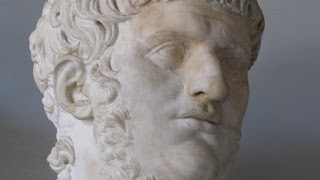Nero Claudius Caesar Augustus Germanicus (born Lucius Domitius Ahenobarbus; 15 December AD 37-9 June AD 68) was a Roman emperor and the final emperor of the Julio-Claudian dynasty, reigning from AD 54 until his death in AD 68.
Nero was born at Antium in AD 37, the son of Gnaeus Domitius Ahenobarbus and Agrippina the Younger, great-granddaughter of the emperor Augustus. Nero was three when his father died.
By the time Nero turned eleven, his mother married Emperor Claudius, who then adopted Nero as his heir. Upon Claudius' death in AD 54, Nero ascended to the throne with the backing of the Praetorian Guard and the Senate. In the early years of his reign, Nero was advised and guided by his mother Agrippina, his tutor Seneca the Younger, and his praetorian prefect Sextus Afranius Burrus, but sought to rule independently and rid himself of restraining influences. The power struggle between Nero and his mother reached its climax when he orchestrated her murder. Roman sources also implicate Nero in the deaths of both his wife Claudia Octavia -supposedly so he could marry Poppaea Sabina- and his stepbrother Britannicus.
Nero's practical contributions to Rome's governance focused on diplomacy, trade, and culture. He ordered the construction of amphitheaters, and promoted athletic games and contests. He made public appearances as an actor, poet, musician, and charioteer, which scandalized his aristocratic contemporaries as these occupations were usually the domain of slaves, public entertainers, and infamous persons. However, the provision of such entertainments made Nero popular among lower-class citizens. The costs involved were borne by local elites either directly or through taxation, and were much resented by the Roman aristocracy.
During Nero's reign, the general Corbulo fought the Roman-Parthian War of 58–63, and made peace with the hostile Parthian Empire. The Roman general Suetonius Paulinus quashed a major revolt in Britain led by queen Boudica. The Bosporan Kingdom was briefly annexed to the empire, and the First Jewish-Roman War began. When the Roman senator Vindex rebelled, with support from the eventual Roman emperor Galba, Nero was declared a public enemy and condemned to death in absentia. He fled Rome, and on 9 June AD 68 committed suicide. His death sparked a brief period of civil war known as the Year of the Four Emperors.
Most Roman sources offer overwhelmingly negative assessments of his personality and reign. Most contemporary sources describe him as tyrannical, self-indulgent, and debauched. The historian Tacitus claims the Roman people thought him compulsive and corrupt. Suetonius tells that many Romans believed the Great Fire of Rome was instigated by Nero to clear land for his planned Golden House. Tacitus claims Nero seized Christians as scapegoats for the fire and had them burned alive, seemingly motivated not by public justice, but personal cruelty. Some modern historians question the reliability of ancient sources on Nero's tyrannical acts, considering his popularity among the Roman commoners. In the eastern provinces of the Empire, a popular legend arose that Nero had not died and would return. After his death, at least three leaders of short-lived, failed rebellions presented themselves as Nero reborn to gain popular support.
More information: British Museum
Nero was born Lucius Domitius Ahenobarbus on 15 December AD 37 in Antium (modern Anzio), eight months after the death of Tiberius. He was an only-child, the son of the politician Gnaeus Domitius Ahenobarbus and Agrippina the Younger. His mother Agrippina was the sister of the third Roman emperor Caligula. Nero was also the great-great-grandson of former emperor Augustus, descended from Augustus' only daughter, Julia.
Nero became emperor in AD 54, aged 16. His tutor, Seneca, prepared Nero's first speech before the Senate.
The Great Fire of Rome began on the night of 18 to 19 July 64, probably in one of the merchant shops on the slope of the Aventine overlooking the Circus Maximus, or in the wooden outer seating of the Circus itself. Rome had always been vulnerable to fires, and this one was fanned to catastrophic proportions by the winds.
Tacitus, Cassius Dio, and modern archaeology describe the destruction of mansions, ordinary residences, public buildings, and temples on the Aventine, Palatine, and Caelian hills. The fire burned for over seven days before subsiding; it then started again and burned for three more. It destroyed three of Rome's 14 districts and severely damaged seven more.
Nero learned that the Senate had declared him a public enemy. Nero prepared himself for suicide, pacing up and down muttering Qualis artifex pereo (What an artist the world is losing!). Losing his nerve, he begged one of his companions to set an example by killing himself first. At last, the sound of approaching horsemen drove Nero to face the end. However, he still could not bring himself to take his own life, but instead forced his private secretary, Epaphroditus, to perform the task.
According to Suetonius and Cassius Dio, the people of Rome celebrated the death of Nero. Tacitus, though, describes a more complicated political environment. Tacitus mentions that Nero's death was welcomed by senators, nobility, and the upper class. The lower class, slaves, frequenters of the arena and the theater, and those who were supported by the famous excesses of Nero, on the other hand, were upset with the news. Members of the military were said to have mixed feelings, as they had allegiance to Nero but had been bribed to overthrow him.
More information: BBC
Wait until I deserve them.

No comments:
Post a Comment